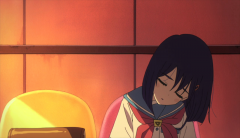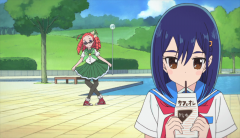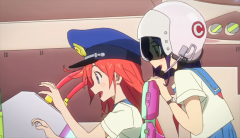And here I thought I know what to expect from this show, yet I would never anticipate a Flip Flappers episode that is a direct continuity to the event of last week. In addition, this episode serves as a nice contrast to last week thematically as well. It only makes sense that after the episode concentrating about two girls performing same role, the next one will be about one girl who carries several roles, right?
Upon noticing that Iro-senpai has been changed in terms of her behaviors since their last Pure Illusion trip, and then later was confirmed by Hidaka that digging deeper into Pure Illusion level can alter the current world, Cocona doesn’t take it too well. It’s understandable in her case, since she’s fine as long as those crazy worlds are all fun and games. But when actions in these universes could potentially bring out consequences, it’s another matter altogether. The Pure Illusion world that Cocona got in this time carries out many characters that directly associated with her characteristics: that world is surprisingly grounded, mundane and completely isolated. That is when Papika multiple roleplaying really makes sense narratively to this episode. She represents the changes. Many roles she performs here aiming to assist Cocona to try something new and at the same time to have fun, demonstrated by many scenes like when the classmate boy who suggests her to skip class, or that emo girl who keeps pressing Cocona to open the drawer (for the meaning of that nail-clipper though, I have no idea but frankly my dear, I don’t give a damn), or trying new clothes. Ultimately, Cocona learns that many things might have been changed by Papika’s and her actions, but changing isn’t always mean bad. In Iro-senpai case, I’d definitely say that she’s happy with herself right now. Isn’t it satisfied enough as long as they bring the happiness to others?
Papika performing various characters also serve as a direct reflection to her own role in Cocona’s life. Take notice that all the roles she plays can be seen as Cocona’s personal and social relationship. She starts as Cocona’s little sister (so cute!), the insecure child who takes care for Cocona and always seeks her attention; then as a classmate boy who genuinely cares for her; then as various social friends who spend time with her, and finally as her sensual lover. All those roles serve as substitutes towards Cocona relationships in order to raise a central message: Where would the real Papika fit in? Is she her family, friend, or lover? Cocona’s for this whole episode trying to sort out her feelings about Papika through having fun times with those variables, and Cocona soon realizes Papika’s none of the above. She holds a special place in Cocona’s heart that raises above all other alternatives.
Moreover, the use of multiple roles also makes a whole lot sense in the context of identity and growing up. Never in any other shows that I’ve seen the constantly jabbed at the role of identity like this one. The first read is of course multiple personalities, and I don’t mean it in a disorder viewpoint. Not unlike the class S, yuri genre where they hold a belief that mutual crush between two girls is a necessary phase for girls to mature into normal, healthy woman; multiple personalities can be interpreted as an adolescent phase, where kids put up many masks of personalities to fully understand who they are, who they are not. The play on gender roles could be seen as a second read, as Papika freely transforms from one gender to another, indicating the break from societal norms towards what are expected for them to perform. Lastly and not really related to the multiple roles, but learning to take responsibility is also another theme that this episode going for, as Cocona learns exactly that from the consequences of her last Pure Illusion trip.
So again, what do we learn this week? Things seem to go badly for Yayaka, as we now know that her place amongst the organization is pretty shaky. And the twins are referred to as the amorphous children, which could mean that they are artificially created by the power of the amorphous. Now it’s an interesting concept if you ask me. It is also confirmed that the deeper level of Pure Illusion world could alter the present world, which could mean the stake is higher next time knowing they have real consequences, but frankly I’d have preferred much better if they don’t try to explain it at all. After all, this is one of those things (the willingness to keep us in the dark that is) that make Flip Flappers so charming and adventurous in a first place. Finally, Papika just mutters “Mimi” out of nowhere to the new sets of character we never heard from before (Mimi’s holding a child if you notice closely, and looks like the guy who is busy with his PC game is the person in Papika’s flashback- or is it Dr. Salt? Hard to tell) and in any ordinary anime that would be a recipe for nightmare kitchen, but it’s Flip Flappers for Christ sake so I know the show will find a way us care about those new characters.
As much as I see many layers toward this episode, as I mentioned before Cocona and Paprika alone can’t carry the episode on their own and this episode was just thisclose from being dragged out, and the lack of interesting visuals certainly won’t help. That doesn’t mean this episode is bad either, and my expectation for the show is still as high as ever, but this episode also isn’t among their best effort.





Enjoyed the detailed analysis of the show, and your point on gender roles.
Thanks TBat, leave it to me to dissect the meaning behind Flip Flappers because the show sure gives us heaps of interesting ideas to brag about; as the same time though I don’t want to over-analyze it because it’s no fun anymore if you keep drawing connection to the most random stuffs.